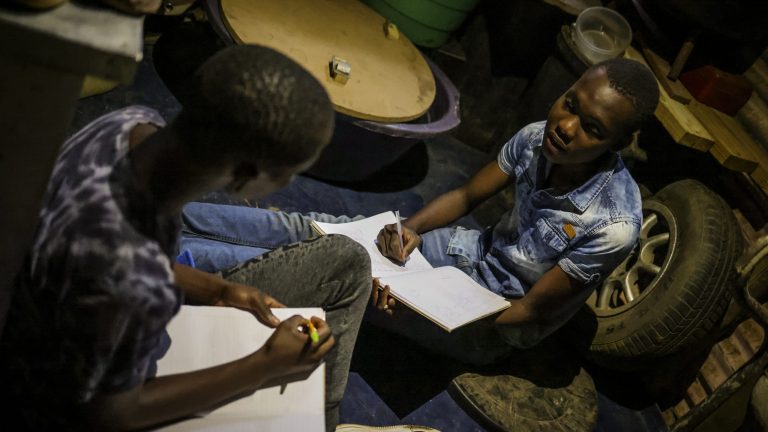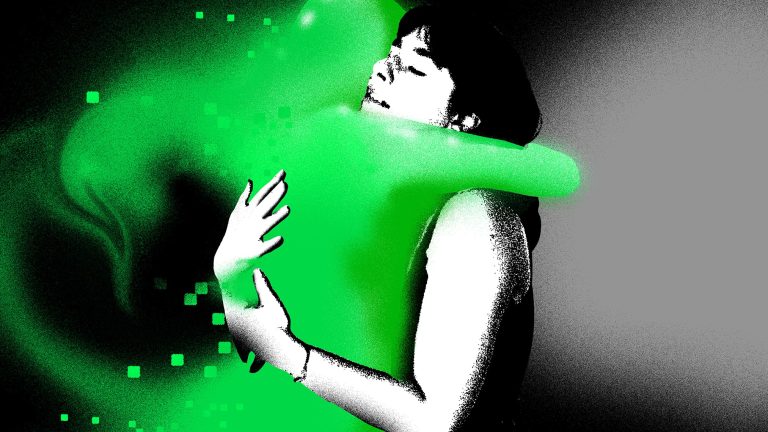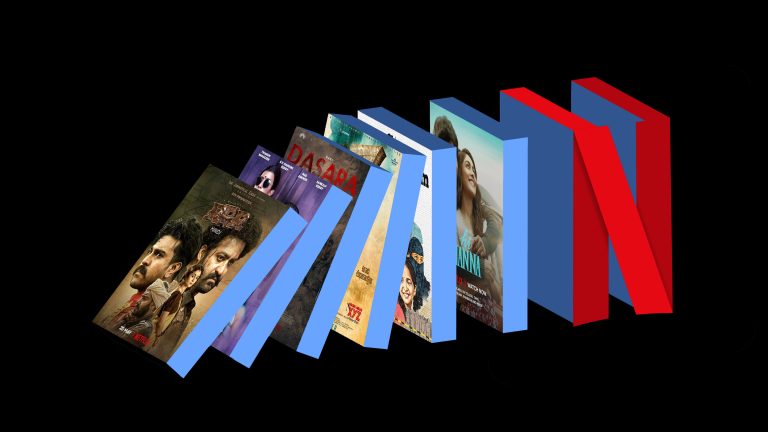Anele Mudau, a 44-year-old butcher in Johannesburg, sleeps in the afternoon and wakes up at midnight to take online courses on financial literacy and help his two kids do research for their homework. His odd hours are not a lifestyle choice but a financial one. Mudau is taking advantage of the online “happy hours” offered by Vodacom: Between midnight and 5 a.m., internet access costs upward of 60% less per megabyte than during the day.
“It’s devouring my family life, my health,” Mudau told Rest of World, adding that he frequently has migraines from staying up late. Mudau says his migraines have become more frequent and worse due to straining himself to remain online at night.
Mudau is one of the thousands of internet users in South Africa who cannot afford daytime broadband prices and use prepaid internet packages that allow them to go online only at night, during off-peak hours. The leading mobile broadband providers in South Africa, including MTN, Vodacom, Cell C, and Telkom Mobile, offer bundles advertised with names such as “Night Surfer,” “Night Express,” or “Night Owl,” sometimes for as low as 25 rand ($1.47) per gigabyte on Cell C, the third-largest network in South Africa.
Pushing people toward using the internet overnight can have severe and unexpected consequences. Home burglary is the most pervasive crime in South Africa, and many break-ins happen at night. According to Statistics South Africa, the national statistical service, 983,000 households were affected by break-ins between 2021 and 2022. “Surfing the web at cheaper midnight ‘happy hours’ alerts gun-wielding robbers on the prowl that there’s a router, a laptop, and some valuables in this house,” Pela Xolile, founder of the Tembisa Better Streets Initiative, which advocates for free internet in Tembisa, told Rest of World.
“Pushing people toward using the internet overnight can have severe and unexpected consequences.”
Dr. Stanley Samusodza, a public health specialist working across southern African countries, told Rest of World that these plans push schoolchildren and workers from low-income households to stay up late, which could impact health. “We now know South Africa has one of the world’s fastest-growing rates of obesity — sleep deficiency helps trigger obesity,” Samusodza said. “Midnight internet is just not proper. From a medical angle, it’s unhealthy. It brings all sorts of trouble when adults stay up late at night to surf the internet.” Research indicates that not getting adequate sleep at night can leave students unable to fully concentrate on studies during daytime hours and leads to significant health complications, such as high blood pressure.
According to a paper published in 2022 by the World Bank, South Africa ranked first among 164 countries in its global poverty database. The World Bank also declared South Africa the most financially unequal of 164 countries. This inequality is evident in internet access: Although more than half the population has a smartphone, most users cannot afford data plans. In 2016, residents across South Africa demanded mobile broadband corporations slash internet charges through mass online protests under the hashtag #DataMustFall. Vodacom, one of South Africa’s biggest mobile networks, gave in and lowered prices by up to 30%. Still, access to the internet is more expensive in South Africa than in neighboring countries such as Zambia and Angola. In Zambia, 1GB of data retails for an average of $1.31, compared to more than $2.67 in South Africa.
In 2022, the Independent Communications Authority of South Africa (ICASA), the telecommunications and broadcasting regulator, told local mobile service providers that it was working on measures to lower broadband costs for citizens, including an amendment to an existing law, which forces the companies to ensure that no purchased data, used or unused, expires within six months. Cell C, a leading South African mobile service provider, offers customers free additional data of up to 500MB between 1:00 a.m. and 7 a.m. if daytime connectivity has been affected by electricity outages.
According to Dr. Mitchell Cox, a broadband expert at the University of the Witwatersrand in Johannesburg, late-night data packages are part of a bigger problem. “I think it’s people [in South Africa] being wise to save money,” Cox told Rest of World. “People do the same with electricity — they use power until they exhaust their free allowance and then go to their neighbor to boil a kettle. Unfortunately, when we have lots of poverty in society, people have to stay up late to use the internet at midnight.”
But users like Mudau and Tsakane-based teacher Chenjerai Moyo don’t have a choice. “We feel second class,” Moyo told Rest of World. Moyo is not formally licensed but tutors students in Tsakane, a township east of Johannesburg. “We are that segment of South African society that’s not well-off enough for daytime internet, but midnight.”
Moyo said he needs a considerable data plan to download material and teach holiday-time geography lessons via WhatsApp to 15 students. He downloads material from the internet each night because he can do so for much less at that time and modifies it for his WhatsApp class in the morning.
“It’s tiring,” Moyo said. “It wears down my eyes staying up late for cheaper internet.”
The phenomenon of “happy hours” is also spreading to wealthier South Africans. Rolling blackouts, partly caused by power cuts from Eskom, the South African state-owned electricity generation company, have left homes and offices enduring hours daily without power.
“The phenomenon of ‘happy hours’ is also spreading to wealthier South Africans. Rolling blackouts have left homes and offices enduring hours daily without power.”
Percy Mokgadji, a municipal clerk in Boksburg, about 20 miles east of Johannesburg, told Rest of World that he has started using the internet at night, even though he is not “desperately poor.”
“I can afford any internet package, but I’m increasingly waiting for midnight internet happy hours, too, because that’s when electricity is switched on to power my Wi-Fi router, and the signal is better,” he said.
South Africa’s government has discussed a plan to give every household 10GB of free data monthly. Details on the exact implementation date are still scant. Last spring, the government announced the National Infrastructure Plan 2050 and brought it to public consultation. A key goal of the plan is to ensure that basic broadband is free, high-speed, and “universally accessible” in all communities of South Africa by 2023–2024.
In addition, the historic nearly $1 billion radio spectrum auction in 2022 will help expand 5G coverage and may also bring down internet prices. Some community projects are already experimenting by connecting homes to high-speed, uncapped Wi-Fi for 5 rand (29 cents) daily.
“Staying up until midnight for [the] internet makes me fear for my children dozing in class, getting blood pressure, and all sorts of daytime antisocial moods,” Mudau said. “We heard of [the] government’s promise to offer all basic internet — and I don’t believe the incompetent South African government can pull it off.”



